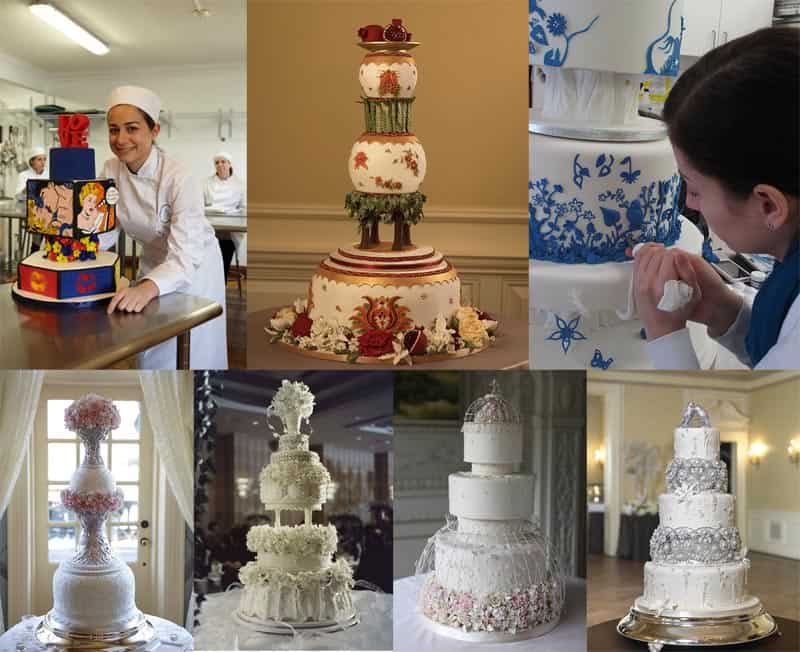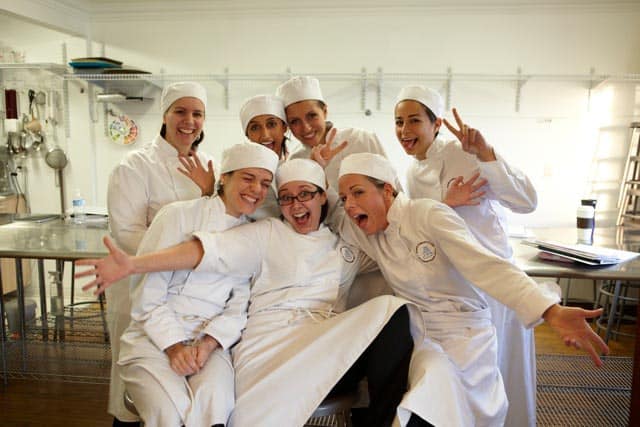If you have a sweet tooth and a fondness for culinary masterpieces, you’re probably familiar with Bonnie Gordon. One of the top cake designers in Canada, three years ago, she decided to combine her renowned baking skills with her many degrees in education and share what she’s learned about her craft, founding the Bonnie Gordon College of Confectionary Arts.
The college offers full and part time career programs, as well as one or two day continuing education classes. and focuses on fostering not only technique, but creativity and vision. If you’re the type who doodles spun sugar confections during meetings, is caught peeking behind the tiers after the couple cuts the cake trying to figure out how it all came together, or dreams of owning their own bakery, Bonnie Gordon wants to help you get there. We spoke with the veteran cake artist about her career and the college.

Who goes to cake school? Where are your students from and what do they hope to achieve?
The students that attend the Bonnie Gordon College of Confectionary Arts come from all over the world. Many are university and college graduates. They are looking for a career change, or would like to pursue their love of baking, cake decorating and are fascinated by the creative opportunities this field has to offer. With the world-wide explosion of interest in cakes, many high school students are now considering our field as a career option.
Can just anyone enroll?
Our classes are designed for beginners with no experience, though many are home bakers who realize that a professional education is required to create beautiful and delicious custom cakes. Many come to us to upgrade the skills and learn at a professional level.
What exactly is Confectionary Arts?
How does one describe an art form that encompasses such a wonderful array of hand-crafted sweet treats? Create delicate, melt-in-your-mouth macarons, yummy cupcakes and stylish mini cakes that satisfy a craving for a sweet treat; cookies that delight children and adults alike with their whimsical sugar decorations; and of course, tiered fantasy cakes perfect for celebrating milestone occasions. It takes time and patience to skillfully craft life-like blossoms out of sugarpaste or artfully manipulate sugar into fragile centerpieces. There is no doubt that what our students and instructors do is truly a form of art.
Why we spell the word confectionary with an “a”?
The term confectionary is commonly used as an adjective as in, confectionary sugar, while confectionery usually refers to a shop which manufactures confections and sugary treats.
In your opinion, are we having a cake and pastry renaissance in Canada? What would you attribute this to?
There is a renaissance not just in Canada, but internationally. This can be seen from our students who come from all over the world: as far away as Africa, India, South America, and Asia. I would attribute this to Martha Stewart Weddings – the attention paid to beautiful cakes and pastries by someone of her stature has helped make it at the forefront of food and baking.
What skills make someone a successful cake artist?
As in any creative field, passion, willingness and a desire to strive for excellence no matter what the skill level. It’s all about working hard, and constantly trying to improve all the time. This is not a field that is exclusive to artists. Those who are considering studying confectionary arts need to know that you don’t have to be an artist to study. All you need is a love for sweets, cakes, and the willingness to put in the hard work.
Who inspired you to become a professional cake and pastry chef?
My mother was a fashion designer. I was raised surrounded by beautiful things, and therefore appreciate the complexity, passion, and time required to create one-of-a-kind, handcrafted pieces.
Can you tease us with some of the speciality cakes you make?
We teach our students to make a wide assortment of cakes. Every single teacher and students uses premium ingredients and we never cut corners. For example, if we use vanilla, we use the best vanilla you can buy. If we use fruits, we only use fresh and natural ingredients. No fillers. Everything we teach is at an artisanal level. Everything is delicious because all of our ingredients are the best. Students are taught to make their own fresh fruit preserves to fill their cakes and not use pre-made or artificial flavourings at all.
What’s a strange fact we may not know about the process of creating such elaborate desserts?
What many might not know is the amount of knowledge of architectural structures that goes into constructing a multi-tier cake. There is an elaborate internal structure that allows for the cake to not topple over.
Baking is intimidating for many, what’s your best advice?
My best advice is to read your recipes carefully and measure your ingredients carefully. One fact to always keep in mind is that every oven heats differently. They often have hot spots, which causes one corner of the oven to be hotter than the others. An important tool to have is a thermometer. The actual oven temperature might be different than what you set it at, so you will have to adjust accordingly. Don’t follow the baking time according to the recipe, but take the cake out of the oven when it’s done. This is especially important to remember, since the oven used to create the recipe might be different than the one you are currently using.
What are some unexpected stresses of a baker who opens their own shop? (I hear you have to start at 5AM!)
This is a very broad question, it depends on what type of baking. There is a huge different between opening a bread, cake and sweets shop; every business is different and therefore would have different requirements.
If you are to open your own cake shop, what you might not be aware of is the stress that goes with delivery of a multi-tier cake (they’re delicate!).
What do you enjoy most about what you do? (Licking icing from a spatula doesn’t count.)
Since transitioning from a cake decorator to opening my own college, my greatest joy is seeing the fabulous success of my many graduates and students that have studied with me over the years.
What inspires you on a regular basis? (Film, literature, travel, your pet?)
My inspiration comes from the passion for excellence in everything I do.
What made you decide to start a school versus owning a bakery or distribution?
It was a natural evolution. I had received a Bachelor of Fine Arts and a post-graduate degree in Art education from Concordia University in Montreal. I later attended Teacher’s College, as well as achieved a Masters in Education.



 Follow Us On Instagram
Follow Us On Instagram
